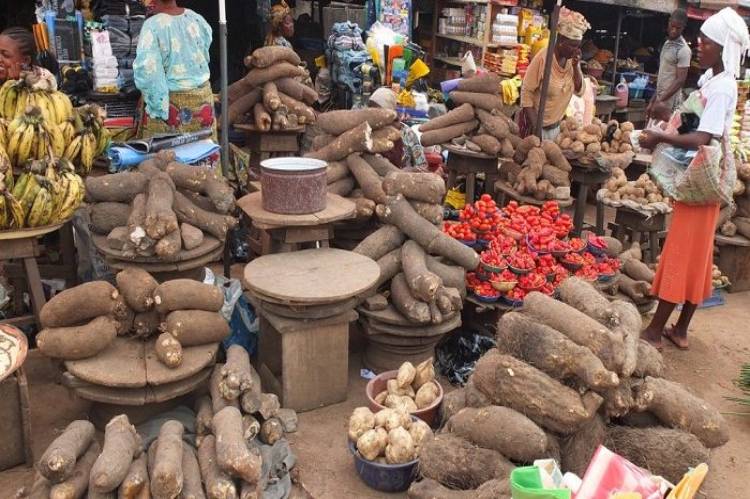The National Bureau of Statistics (NBS) said Nigeria’s headline inflation rate increased to 24.08 percent in July 2023.
The NBS disclosed this in its Consumer Price Index (CPI) and Inflation Report for July, which was released in Abuja on Tuesday.
According to the report, the figure is 1.29 percent points higher compared to the 22.79 percent recorded in June.
It said on a year-on-year basis, the headline inflation rate in July was 4.44 percent higher than the rate recorded in July 2022 at 19.64 percent.
It added:” This shows that the headline inflation rate (year-on-year basis) increased in July 2023 when compared to the same period in July 2022.”

Read Also: I collected money from job-seekers for FCC Chairman- Ex-staff alleges
The report said that the contributions of items on the divisional level to the increase in the headline index were food and non-alcoholic beverages at 12.47 percent and housing, water, electricity, gas, and other fuel at 4.03 percent.
Others were; clothing and footwear at 1.84 percent; transport at 1.57 percent; furnishings, household equipment, and maintenance at 1.21 percent and education at 0.97 percent, and health at 0.72 percent.
The report said: “Miscellaneous goods and services at 0.40 percent; restaurant and hotels at 0.29 percent; alcoholic beverage, tobacco, and kola nut at 0.26 percent; recreation and culture at 0.17 percent, and communication at 0.16 percent.”
In addition, the report said, on a month-on-month basis, the headline inflation rate in July 2023 was 2.89 percent, which was 0.76 percent higher than the rate recorded in June 2023 at 2.13 percent.
It added: ” This means that in July 2023, on average, the general price level was 0.76 percent higher relative to June 2023.”
It said the percentage change in the average CPI for the 12 months ending July 2023 over the average of the CPI for the previous 12 months period was 21.92 percent.
The report added: “This indicates a 5.17 percent increase compared to 16.75 percent recorded in July 2022.”
It said that the food inflation rate in July was 26.98 percent on a year-on-year basis, which was 4.97 percent higher compared to the rate recorded in July 2022 at 22. 02 percent.
Read Also: Illegal Firearms Possession: Court fixes date for Emefiele’s trial
The report continued: “The rise in food inflation is caused by increases in prices of oil and fats, bread and cereals, fish, potatoes, yams, and other tubers, fruits, meat, vegetable, milk, cheese and eggs.”
It said on a month-on-month basis, the food inflation rate in July was 3.45 percent, which was a 1.06 percent rise compared to the rate recorded in June at 2.40 percent.
“The rise in food inflation on a month-on-month basis was caused by increases in prices of bread and cereals, potatoes, yam and other tubers, fish, oil, and fat,” the report said further.
It said: “All items less farm produce or core inflation, which excludes the prices of volatile agricultural produce stood at 20.47 percent in July on a year-on-year basis.
“This increased by 4.41 percent compared to 16.06 percent recorded in July 2022.’’
The report said the highest increases were recorded in prices of passenger transport by air and road, gas, vehicle spare parts, medical services, maintenance, and repair of personal transport, among others.
The NBS said on a month-on-month basis, the core inflation rate was 2.11 percent in July 2023.
It added: “This indicates a 0.34 percent rise compared to what was recorded in June 2023 at 1.77 percent.
“The average 12-month annual inflation rate was 18.84 percent for the 12 months ending July 2023.
“This was 4.31 percent points higher than the 14.53 percent recorded in July 2022.”
The report said on a year-on-year basis in July, the urban inflation rate was 25.83 percent, which was 5.74 percent higher compared to the 20.09 percent recorded in July 2022.
It said: “On a month-on-month basis, the urban inflation rate was 3.05 percent in July representing a 0.75 percent rise compared to June 2023 at 2.31 percent.’
The report said on a year-on-year basis in July, the rural inflation rate was 22.49 percent, which was 3.26 percent higher compared to the 19.22 percent recorded in July 2022.
It added: “On a month-on-month basis, the rural inflation rate in July was 2.74 percent, which increased by 0.78 percent compared to June 2023 at 1.96 percent.’’
On states’ profile analysis, the report showed in July, all items’ inflation rate on a year-on-year basis was highest in Kogi at 28.45 percent, followed by Lagos at 27.30 percent, and Ondo at 26.83 percent.
It, however, said the slowest rise in headline inflation on a year-on-year basis was recorded in Borno at 20.71 percent, followed by Jigawa at 20.85 percent, and Sokoto at 20.92 percent.
The report, however, said in July 2023, all items inflation rate on a month-on-month basis was highest in Kogi at 4.99 percent, Abia at 4.12 percent, and Akwa Ibom at 4.07 percent.
It added: “Jigawa at 0.16 percent, followed by Taraba at 1.09 percent and Yobe at 1.10 percent recorded the slowest rise in month-on-month inflation.”
Read Also: Finance Bill: Tertiary Education Tax will worsen economic hardship – NECA
The report said food inflation in June, on a year-on-year basis, was highest in Kogi at 34.53 percent, followed by Lagos at 32.52 percent, and Bayelsa at 31.31 percent.
It added: “Jigawa at 20.90 percent, followed by Sokoto at 21.63 percent and Kebbi at 22.45 percent recorded the slowest rise in food inflation on a year-on-year basis.’’
The report, however, said on a month-on-month basis, in July, food inflation was highest in Kogi at 6.73 percent, followed by Akwa Ibom at 5.64 percent and Bayelsa at 4.59 percent.
It said: “With Taraba at -0.21per cent, followed by Jigawa at 0.28 percent and Yobe at 0.90 percent recorded the slowest rise on month-on-month food inflation.’’ (NAN)



Comments are closed.